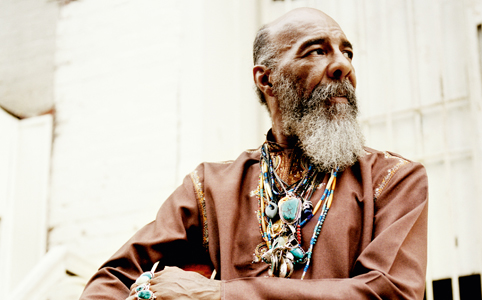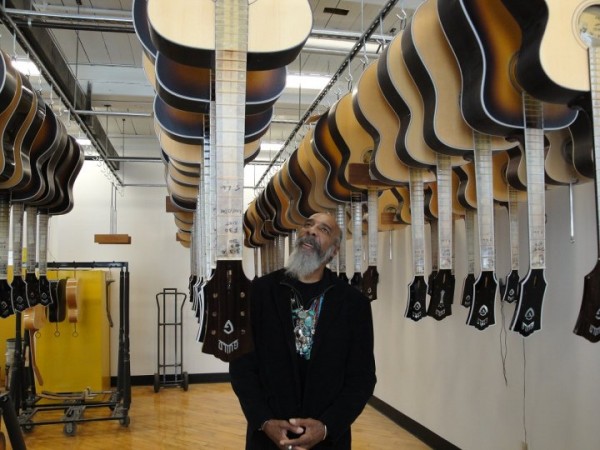The Moment for a Generation
Examining the Next Great Strife with Richie Havens
Words by Martin Halo
Northern New Jersey – The sentiments of a generation who gathered 500,000 strong at Woodstock in 1969 are echoing across the winds of time — speaking to a nation threatened by religious fundamentalism, economic downturn, growing unemployment and environmental disaster. When Richie Havens stepped foot upon the wooden stage at Yasgur’s Farm, he was speaking to the youth, with ideologies filled with ambition, rebirth and hope.
Though the times have changed, Havens remains as a pivotal voice from the folk movement of old, alongside Joan Baez and Bob Dylan, who carried on the message of an American cultural revolution sparked by the sacrifice to end World War II. But 70 years after the last great strife against evil, the excesses and vices of a robust superpower have again managed to test the resolve of men. Decades of excess, greed, entitlement and corruption has resulted in a country staring down the slippery cliff of a second Great Depression, an environmental catastrophe dumping upwards of 100,000 barrels of crude into the Gulf of Mexico each day, and the growing reality for nuclear proliferation.
The struggles that we will face over the next 10 years will test our will as a nation. This generation’s defining moment is upon us, a moment that is still unclear; a moment that if we let slip away, or fail to unify in order to meet, will destroy the prosperity and hope of our future.
We speak with Richie Havens in order to understand how the ideals of Woodstock generation have lost their way, and why America is on the verge of a new great strife.
www.richiehavens.com
“The fact that a hippie had money is what turned them into yuppies”, says Richie Havens. “But you have to remember that these are all terms that the newspapers coined. When a yuppie came about, it was not a desirable category to be a part of” as he responds to what qualities separated the two social classes. “It is all steps, the first step learned, the second step borrowed, and now the third step, well.”
“The yuppies were part of the movement but not attached. A yuppie was a person who couldn’t go to the rallies because their family expected a lot from them. It was easy to get hooked into these social classifications”, says Havens. “Think about it, what if you are walking down the road and you put $20 into a machine and $25 came out. For the yuppies that is how they got hooked.”
Progressive reforms and the hopes for green energy, all take a back seat to the realities of a nation sustained by oil. It is more than our energy; it represents America’s way of life: excess, greed and ambition. But as Havens will explain the Gulf Oil spill which started 40 miles off the coast of Louisiana was not the sole result of greed, but rather the realities of our survival. “It is not greedy for us to be exploring areas that we haven’t realized their full potential”, he says. “That ball was thrown a long time ago and that is something which young people have a hard time understanding. If simple greed was the cause of an environmental disaster, then the earth is already in trouble and we would just be waking up now!”
The leak in the crust a mile beneath the crippled Deepwater Horizon drilling rig back on April 20th was uncorked by a borehole, an additional two miles into the earth with substandard attention to safety.


– Richie Havens

“I did my crying” says Richie Havens. “When everybody found out what was actually happening, I realized that our way to survive was written in the same trail. It is a trail we can’t get off, unless we all do it together.”
The realities of what oil represents within the world’s economy are unmasked by an environmental disaster the size of Chernobyl, and growing by the day. For starters, BP employs 22,000 residents along the Gulf coast and is a major insurer for American pensions. In addition, the US owns 40% of the oil company and even though BP officially changed its name from British Petroleum back in 2001, England’s economic backbone is still supported by the energy giant.
Even if America wanted to boycott British Petroleum, and wanted to change from fossil fuels to clean energy, the economic implications of such a shift would seal the fate of not only hundreds of thousands American jobs related to the oil industry, but the stability of economies.
“We have a very small group of people working with our money”, says Richie Havens. “That is why young people are afraid. They are unsure of what or where to go. It turns out much of what is being played out today was created in yesteryears. The hidden doves which supplied the money were also part of putting Obama in the chair in the first place.”
During his time in the Senate and while running for President, Barrack Obama received $77,051 in campaign contributions from BP [citation], the highest recipient of the $3 million spent on American politicians over the past two decades. “There was no thought about it”, continues Havens, “It is a weird system to me. This isn’t about race, or politics, this is about us rising above politics and being individual thinkers and people. The youth were not educated to this whole cycle. The cycles in the 70s and 80s, a cycle that was almost spiritually inept. There is a great divide between the generations. Young people don’t have anything left to do, it’s all been done. Everything was set up to help my generation. Do you want to know how this disenfranchisement happened for the youth? It happened because the political guys made it happen. They said that the youth is going to be used as a well for the generation prior to them.”
World War II was our last great struggle as a nation. The years leading up to 1941, America was in an economic downturn. The Great Depression had killed millions of jobs and the wheels turning the economy had come to a grinding halt. As the nation sent its son’s to the slaughter, the homeland unified in an effort to support the War by mass producing tanks, weapons, planes, bullets, and bombs. It saved the nation and propelled into a leading world superpower.
The social climate over the past decade has been yielding the same ominous conditions that would result in another great strife before a substantial breakthrough as a nation. But what will it be? Will it be a military conflict, a social conflict or maybe a larger environmental issue that would threaten our survival as a human race?
Is the next decade going to hold our defining moment as a generation?
“I absolutely feel it is”, responds Havens. “It is the waking up that I think is the bridge. I truly believe that. The younger groups are just starting to realize that it is all about to come to a head because we left a trail, and it’s a twisty trail. These things are wake up calls to your brain! These are all chances for us to become universal people.”
If green energy is our next great sacrifice, or our next great decision – then why must we wait for an unprecedented disaster to happen in order for this generation to want to change?
“I’ll tell you”, says Havens, “it is because so many are unable to see both sides of the corner. Imagine the education and the perspective you would have if you could see the folks on either side. You can see the people who have turned the corner already, those who are standing in line, and those who never made it to the corner in the first place. What I mean by this is, there are so many polarized individuals that are either unable or unwilling to look past their own lines that they didn’t bother to show up when they should have been there.”
“Something is about to happen”, Havens concludes, “it has already happened! But what the youth must recognize is how to catch a star.”
Richie Havens will be performing at the Mill House in Spring Lake on June 24, and the First Congressional Church in Montclair on July 24.
www.richiehavens.com
TheWaster.com | The Gulf
01.21.2010



How fitting on this Earth Day Richie should pass on to the next life…a wise talented soul that cared deeply about the environment and the affect humans had on it… RIP